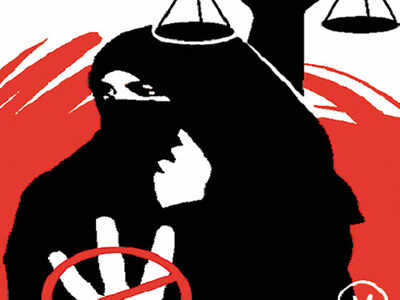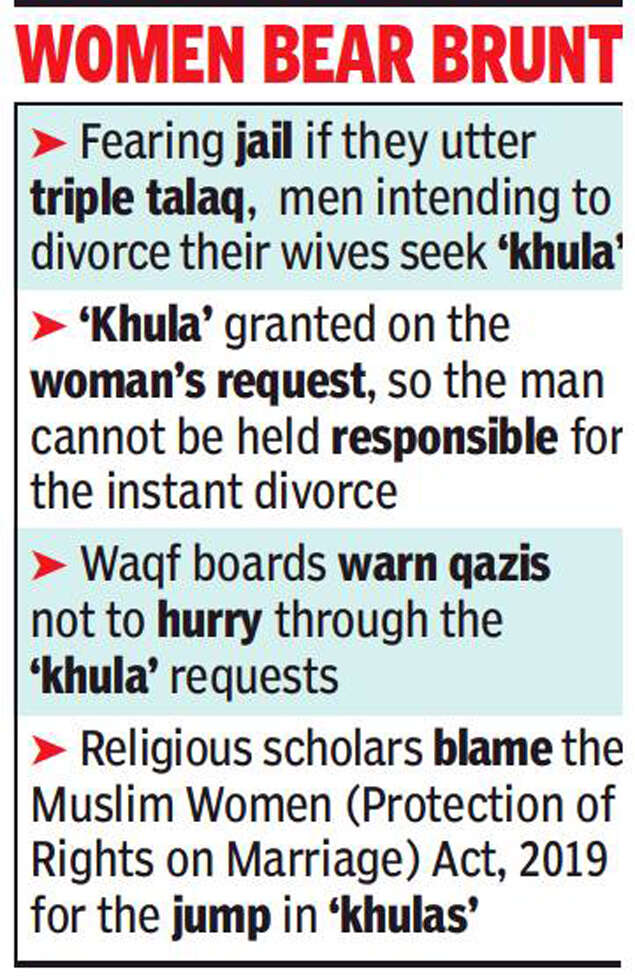Top Searches
- News
- City News
- Hyderabad News
- Instant talaq is now through ‘khula’ in Telangana, Andhra Pradesh
Instant talaq is now through ‘khula’ in Telangana, Andhra Pradesh

Representative image
HYDERABAD: The criminalisation of instant divorce or triple talaq has unwittingly led to a spurt in `khula’ cases in Telangana and Andhra Pradesh. Fearing jail term if they invoke instant divorce, many men, who want to divorce their wives, are forcing them to seek `khula’.

‘Khula’ is a process of separation of married couples in which the woman seeks divorce. Since ‘khula’ is granted on the woman’s request, the man cannot be held responsible for the instant divorce. Muslim religious scholars and qazis, who are authorised to solemnise marriages and grant divorce, blame the Muslim Women (Protection of Rights on Marriage) Act, 2019 for the jump in ‘khulas’.
Ayesha* was forced to settle for a ‘khula’ when -- after three years of mental and physical torture – she finally decided to raise her voice last year. This was when her unemployed husband, who had claimed to be a driver when they got married, insisted on getting a DNA test done for their just-born daughter. “He accused me of having an affair with someone and the child not being his. When I resisted, he and his mother beat me. I sought a divorce, but he refused. I had no choice but to take ‘khula’ for the safety of my child,” the 25-year-old said. She does odd jobs from her house in Golconda now, to make some money.
That the number of ‘khula’ cases has increased is clear from the recent warning issued by the Telangana waqf board to qazis. Board chairman Mohammad Saleem warned qazis not to hurry through the ‘khula’ requests.
Talaq cases drop but problem remains
Qazis should check the veracity of the request and make it doubly sure it is not an altered case of triple talaq, before issuing ‘khula’ certificate,” he said.
“Of course, there may have been a drop in cases of instant talaq, but the problem remains. The new legislation has further cornered Muslim women, particularly hailing from lower strata. Instead of a man pronouncing instant talaq, he is forcing his wife to take ‘khula’. Either way, the woman is the sufferer,” said Moulana Mohammad Hussamuddin Sani Aqil.
Moulana Hussamuddin, who is popular as Amir-e-Millet-e-Islamia (leader of Muslim community), told TOI that increase in ‘khula’ cases is a cause for concern. Questions are asked when such a woman seeks remarriage as the prospective husband and his relatives make sure to know the reasons for ‘khula’. This is because many hold the woman at fault and responsible for the divorce.
Aware of such social scrutiny, Sayeda* still decided to accept ‘khula’ when she found out her husband was having an affair with his sister-in-law. She had already been living away from him and wasn’t getting any monetary support. “He told me he was going overseas and will never have anything to do with me again. ‘Khula’ was my only choice; at least I can remarry now,” Sayeda said.
Mufti Mastan Ali, a senior scholar of Islamic jurisprudence, and his wife, who is also a mufti, run ‘Shariah Panchayat’ to amicably resolve matters relating to Muslim personal law including divorce and ‘khula’ cases. According to him, there has been a two-fold increase in ‘khula’ cases while there is a drop to the same extent in triple talaq cases.
“This means there is no letup in the cases of instant talaq. It has only changed its form to ‘khula’. Muslim women continue to suffer as before the passing of the new legislation,” Mufti Mastan said.
The waqf boards in Telangana and Andhra Pradesh do maintain records of divorce as they are the authorised bodies to issue divorce certificates. But the records are not up-todate as many do not approach the board to get the certificate. They simply take the divorce forms from the local qazi.
(*Names changed to protect identity of women)

‘Khula’ is a process of separation of married couples in which the woman seeks divorce. Since ‘khula’ is granted on the woman’s request, the man cannot be held responsible for the instant divorce. Muslim religious scholars and qazis, who are authorised to solemnise marriages and grant divorce, blame the Muslim Women (Protection of Rights on Marriage) Act, 2019 for the jump in ‘khulas’.
Ayesha* was forced to settle for a ‘khula’ when -- after three years of mental and physical torture – she finally decided to raise her voice last year. This was when her unemployed husband, who had claimed to be a driver when they got married, insisted on getting a DNA test done for their just-born daughter. “He accused me of having an affair with someone and the child not being his. When I resisted, he and his mother beat me. I sought a divorce, but he refused. I had no choice but to take ‘khula’ for the safety of my child,” the 25-year-old said. She does odd jobs from her house in Golconda now, to make some money.
That the number of ‘khula’ cases has increased is clear from the recent warning issued by the Telangana waqf board to qazis. Board chairman Mohammad Saleem warned qazis not to hurry through the ‘khula’ requests.
Talaq cases drop but problem remains
Qazis should check the veracity of the request and make it doubly sure it is not an altered case of triple talaq, before issuing ‘khula’ certificate,” he said.
“Of course, there may have been a drop in cases of instant talaq, but the problem remains. The new legislation has further cornered Muslim women, particularly hailing from lower strata. Instead of a man pronouncing instant talaq, he is forcing his wife to take ‘khula’. Either way, the woman is the sufferer,” said Moulana Mohammad Hussamuddin Sani Aqil.
Moulana Hussamuddin, who is popular as Amir-e-Millet-e-Islamia (leader of Muslim community), told TOI that increase in ‘khula’ cases is a cause for concern. Questions are asked when such a woman seeks remarriage as the prospective husband and his relatives make sure to know the reasons for ‘khula’. This is because many hold the woman at fault and responsible for the divorce.
Aware of such social scrutiny, Sayeda* still decided to accept ‘khula’ when she found out her husband was having an affair with his sister-in-law. She had already been living away from him and wasn’t getting any monetary support. “He told me he was going overseas and will never have anything to do with me again. ‘Khula’ was my only choice; at least I can remarry now,” Sayeda said.
Mufti Mastan Ali, a senior scholar of Islamic jurisprudence, and his wife, who is also a mufti, run ‘Shariah Panchayat’ to amicably resolve matters relating to Muslim personal law including divorce and ‘khula’ cases. According to him, there has been a two-fold increase in ‘khula’ cases while there is a drop to the same extent in triple talaq cases.
“This means there is no letup in the cases of instant talaq. It has only changed its form to ‘khula’. Muslim women continue to suffer as before the passing of the new legislation,” Mufti Mastan said.
The waqf boards in Telangana and Andhra Pradesh do maintain records of divorce as they are the authorised bodies to issue divorce certificates. But the records are not up-todate as many do not approach the board to get the certificate. They simply take the divorce forms from the local qazi.
(*Names changed to protect identity of women)
FacebookTwitterLinkedinEMail
Start a Conversation
end of article

